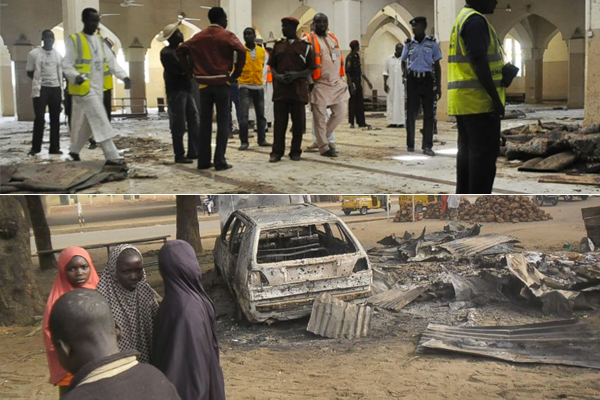
Boko Haram has become increasingly deadly recently, but many religious and African leaders question the West’s commitment to solving this terrorist threat.
Terrorist attacks by Islamist terrorist group, Boko Haram, in Borno, a North-Eastern Nigerian State, are on the rise, as at least hundreds, potentially thousands, of innocent villagers were killed in an onslaught by the insurgents, leaving blood and tears in their trail, even as hundreds of others were critically injured. The incidents took place in Baga, a bordering town with Chad, was said to have unfolded over a couple of days, after the insurgents reportedly seized control of a major military base in the town since January 3. The attack also destroyed thousands of homes and buildings.
One man who escaped the bloody attack described the picture of many innocent people being “slaughtered as insects.” The extremists were firing sporadically at vehicles laden with crowds of villagers trying to make a getaway to safety in Maiduguri, the Capital City of the troubled Borno State. “We saw dead bodies especially, on the islands of Lake Chad where fishermen had settled,” said Takakumi, the 55-year-old farmer who was lucky to escape with one of his two wives, relayed to Premium Times, a Nigerian daily tabloid. In recalling the vicious attacks, he told how he has been unable to find four of his children, his elder brother and his first wife, after he was lucky to escape with his second wife in the chaos.
Though Amnesty International reported the death toll of the Boko Haram attack in Baga at nearly 2,000, most eye witness accounts, as well as a statement from Major Gen. Chris Olukolade, a Military Spokesman, claim the count is closer to 150 people who have lost their lives. The recent Baga massacre, which has drawn condemnation from several world leaders, was just one in a series of deadly attacks committed by Boko Haram in and around Nigeria.
The end to this senseless bloodshed does seems far away, as the terrorists seem to be getting stronger and stronger by the day, launching even deadlier attacks, even in the face of increased military action against them. On Saturday, January 10th, Boko Haram carried out a suicide bomb attack on a major market in the Capital City of Maiduguri, using a 10-year-old girl strapped with explosives as a vessel. The explosives were believed to have been detonated remotely by an on-looking attacker, when the young girl was discovered with the concealed weapon by a vigilante group at the gate, killing at least 20 people and leaving 18 others injured according to police reports.
16 towns/villages razed by #BokoHaram in #Nigeria.100's dead. No breaking news cycle, no live reports, no international outrage, no hashtags
— Imad Mesdoua (@ImadMesdoua) January 9, 2015
Although the recent Boko Haram attack has been able to draw considerable international attention and condemnation from the West, prominent African figures and religious leaders have called out western leaders for not paying enough attention to the attacks in Nigeria. Ignatius Kaigama, president of the Nigerian Bishops Conference and the Catholic Archbishop of Jos, bared his anger over the sad neglect of Nigeria in its difficult times, saying that the West should do more than expressing mere solidarity. “We have always said that there should be concern expressed more concretely by the West beyond just expressing their solidarity. They should do more to combat Boko Haram. Compare what has happened in Paris and what is happening here. There is a great difference,”Ignatius Kaigama said. Further warning that the Boko Haram menace had the capacity to become a global problem if not contained, he added “I can smell a lot more trouble. It’s not going to be confined to this region. It’s going to expand. It will get to Europe and elsewhere.”
Comparing the disparity in attention and help given to France from the West over the recent Charlie Hebdo attack, Imad Mesdoua, a political analyst at consultants Africa Matters, tweeted “No breaking news cycle, no live reports, no international outrage, no hashtags.” Hollywood actor Boris Kodjoe, while congratulating those who took part in Paris’ unity march, asked “can somebody tell me why nobody is marching for those [Nigerian] victims? Any world leaders planning a trip to Lagos or Abuja this week? Too Busy? Bad flight connections?”
These public figures, and others are enraged over the neglect, possibly interpreting it to lend credence to the notion that white lives are more valuable than black lives. They are calling for more concrete steps to be taken, and more commitments, particularly from western nations, to helping Nigeria with the Boko Haram problem.
